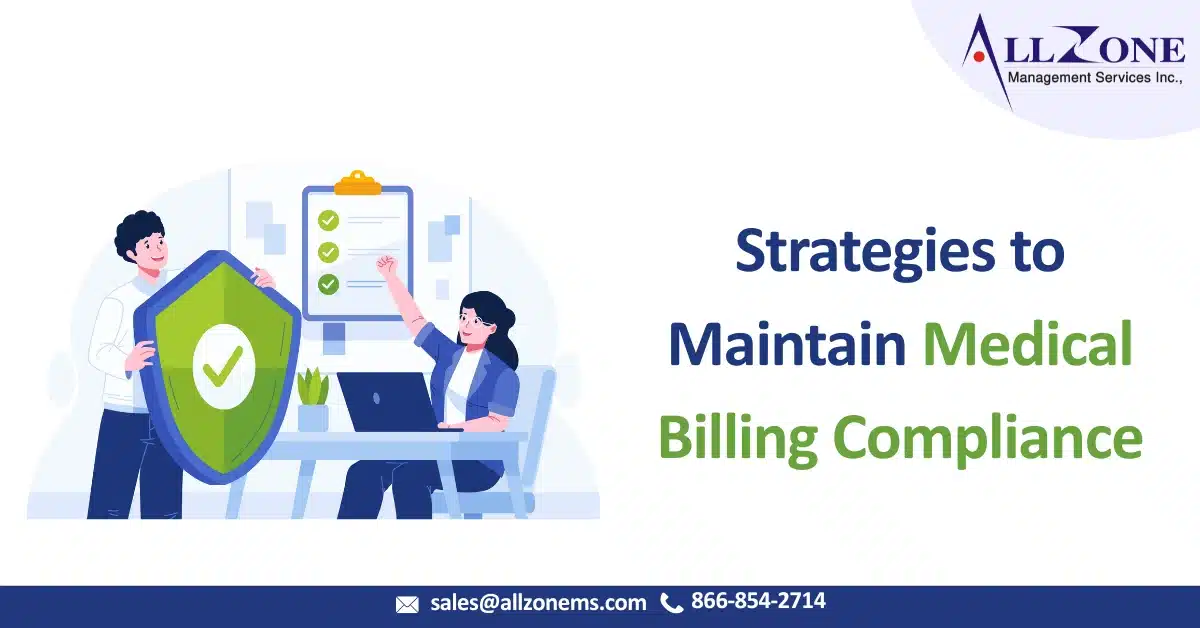In today’s evolving healthcare landscape, medical billing compliance is more than just following rules—it’s about safeguarding your organization from costly fines, legal risks, and reputational damage. Non-compliance in billing and coding can trigger audits, revenue loss, and even exclusion from federal healthcare programs like Medicare and Medicaid.
At Allzone Management Services, we help healthcare providers stay compliant with the latest billing standards, payer policies, and regulatory requirements. Let’s explore the top strategies to maintain medical billing compliance and avoid penalties.
1. Understand Key Regulatory Frameworks
Compliance starts with understanding the laws and regulations that govern medical billing. Every healthcare provider should be familiar with these essential frameworks:
- HIPAA (Health Insurance Portability and Accountability Act): Ensures the privacy and security of patient health information during billing and data exchange.
- False Claims Act (FCA): Prohibits submitting false or fraudulent claims for government reimbursements.
- Anti-Kickback Statute (AKS): Prevents illegal financial incentives in exchange for patient referrals.
- Stark Law: Regulates physician self-referrals for certain healthcare services.
Failure to comply with these laws can lead to severe penalties, financial losses, or exclusion from federal programs. Keeping your staff trained and your billing practices transparent is the first step toward compliance.
2. Stay Updated with Coding Changes (ICD, CPT, and HCPCS)
Medical codes evolve every year. Using outdated or incorrect codes can result in claim denials, compliance violations, and loss of revenue.
Here’s what you should monitor:
- ICD-10-CM/ICD-11: Diagnosis codes that reflect patient conditions.
- CPT and HCPCS: Codes for medical procedures, supplies, and services.
Allzone’s team stays ahead by tracking annual updates from the AMA and CMS, ensuring every code used is current and compliant. Implementing regular code reviews and staff training can minimize billing errors and ensure claims are processed correctly the first time.
3. Conduct Regular Internal Audits
Regular internal audits are one of the most effective ways to detect compliance gaps before they escalate. These audits help:
- Identify coding inaccuracies and documentation errors.
- Ensure claims match medical records and physician notes.
- Detect any patterns of overcoding or undercoding.
Allzone recommends scheduling quarterly audits to maintain consistent accuracy. By reviewing claims data, charge capture, and remittance advice, organizations can ensure billing practices align with payer rules and federal guidelines.
4. Implement Robust Staff Training and Certification
Compliance is a team effort. Every employee—from front-desk staff to billing specialists—plays a crucial role. Regular training helps staff stay informed about:
- Regulatory updates from CMS, OIG, and private insurers.
- Coding revisions and claim submission requirements.
- HIPAA privacy and data security measures.
Encouraging certifications like CPC (Certified Professional Coder) or CPB (Certified Professional Biller) can enhance staff expertise and minimize compliance risks. At Allzone, we emphasize continuous education to ensure every billing task meets the highest compliance standards.
5. Strengthen Documentation Practices
Incomplete or inaccurate documentation is one of the leading causes of compliance violations. Every claim must be backed by:
- Clear and detailed clinical notes.
- Proper authorization and patient consent forms.
- Accurate service dates and provider details.
Implementing electronic health record (EHR) integration can help streamline documentation and reduce human error. Remember: if it’s not documented, it didn’t happen—so complete documentation is key to compliance.
6. Leverage Technology for Compliance Automation
Incorporating technology can transform compliance management. Tools like AI-driven billing systems and compliance monitoring software can:
- Detect anomalies in coding and billing.
- Flag potential HIPAA or data breaches.
- Automate claim validation before submission.
At Allzone, we use advanced automation and AI-based quality checks to ensure accuracy and compliance at every stage of the billing process. This not only reduces manual errors but also improves turnaround time and payment accuracy.
7. Establish a Compliance Committee or Officer
For medium to large healthcare organizations, designating a compliance officer or forming a compliance committee is essential. Their role includes:
- Monitoring regulatory updates and policy changes.
- Managing audit findings and implementing corrective actions.
- Reporting compliance issues to senior management.
This proactive oversight ensures continuous improvement and accountability across all departments.
8. Manage Denials with a Compliance Lens
Denial management isn’t just about reworking claims—it’s about understanding why they were denied in the first place.
Common compliance-related denial reasons include:
- Missing modifiers or incorrect CPT/ICD combinations.
- Incomplete patient data.
- Lack of medical necessity documentation.
Allzone’s denial management experts analyze root causes and help providers establish preventive strategies. By maintaining compliance-focused denial tracking, organizations can enhance revenue integrity and reduce repeat errors.
9. Protect Patient Data and Privacy
HIPAA compliance is non-negotiable in medical billing. Any breach in patient data can result in hefty fines and loss of trust. To ensure data protection:
- Use encrypted systems for storing and transmitting patient information.
- Restrict data access to authorized personnel.
- Regularly update passwords and security patches.
Allzone employs strict data encryption and secure transfer protocols to keep client and patient data protected at every step.
10. Partner with a Trusted Medical Billing Company
Outsourcing to a professional medical billing company like Allzone Management Services ensures complete compliance without the burden of managing it internally.
Our experts handle:
- Coding audits and claim accuracy verification.
- HIPAA-compliant billing and reporting.
- Real-time updates on payer policy and regulatory changes.
With Allzone as your compliance partner, you can focus on patient care while we safeguard your revenue cycle integrity.
Conclusion
Maintaining medical billing compliance is a continuous process that requires diligence, training, and technology. Non-compliance not only risks financial penalties but also undermines your organization’s reputation.
By implementing the strategies above—regular audits, staff education, accurate coding, strong documentation, and secure systems—you can ensure compliance and long-term success.
At Allzone Management Services, we help healthcare providers achieve peace of mind through accurate, compliant, and efficient medical billing solutions. Stay compliant, stay profitable, and stay focused on what matters most—delivering quality patient care.

